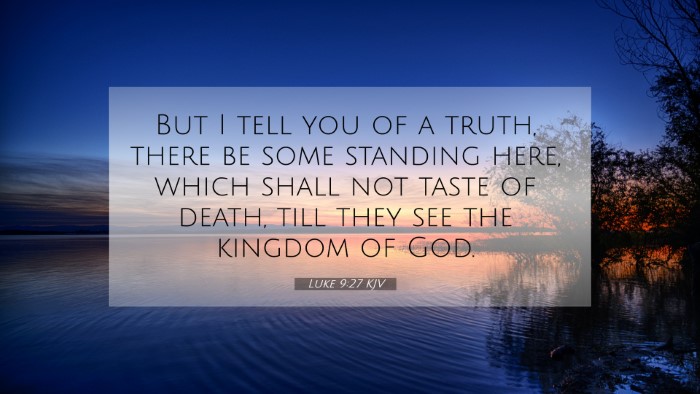Understanding Luke 9:27
Luke 9:27 states: "But I tell you truly, there are some standing here who will not taste death until they see the kingdom of God." This verse has been subject to much interpretation and theological discussion across multiple commentaries. Below is a synthesized explanation drawing from Matthew Henry, Albert Barnes, and Adam Clarke.
Contextual Background
This statement is made within the broader context of Jesus' teaching regarding His impending suffering, the cost of discipleship, and the nature of God's Kingdom. Jesus often spoke in profound ways that invited his listeners to think beyond immediate realities.
Main Insights from Commentaries
-
Matthew Henry's Commentary:
Henry emphasizes the significance of the term “kingdom of God” as it relates to both present and future realities of the reign of Christ. He interprets this verse as a promise that some of the disciples would have the privilege of witnessing the transfiguration and the resurrection—a foreshadowing of the glory of the Kingdom.
-
Albert Barnes' Commentary:
Barnes suggests that this verse indicates a clear message about the transient nature of earthly life contrasted with the eternal nature of God’s kingdom. He argues that Jesus, in this statement, prepares His disciples for the trials ahead, assuring them that their faith would lead them to divine realities sooner.
-
Adam Clarke's Commentary:
Clarke posits that the phrase "will not taste death" indicates that the disciples will live to witness remarkable events that define the coming of the Kingdom, particularly the transfiguration and the resurrection. He notes that the idea of witnessing such events ties closely to the expectation of future hope in Christianity.
Connecting Bible Verses
This verse can be cross-referenced with several significant scriptures that deepen the understanding of Jesus' message regarding the Kingdom of God:
- Matthew 16:28 - "Truly I tell you, some who are standing here will not taste death before they see the Son of Man coming in his kingdom."
- Mark 9:1 - "And he said to them, 'Truly, I say to you, there are some standing here who will not taste death until they see the kingdom of God after it has come with power.'
- John 3:3 - "Jesus replied, 'Very truly I tell you, no one can see the kingdom of God unless they are born again.'
- Luke 10:9 - "Heal the sick who are there and tell them, ‘The kingdom of God has come near to you.'
- Acts 1:8 - "But you will receive power when the Holy Spirit comes on you; and you will be my witnesses in Jerusalem, and in all Judea and Samaria, and to the ends of the earth."
- Romans 14:17 - "For the kingdom of God is not a matter of eating and drinking, but of righteousness, peace and joy in the Holy Spirit."
- Revelation 11:15 - "The kingdom of the world has become the kingdom of our Lord and of his Messiah, and he will reign for ever and ever."
Thematic Considerations
The verse raises important themes related to:
- The Assurance of God’s Kingdom: Believers are given a glimpse of the Kingdom's arrival and its implications for their lives today.
- Faith and Revelation: The experience of witnessing the Kingdom may not be linked to physical death, but rather to spiritual revelation and understanding.
- Hope in Trials: It provides hope and encouragement during hardships, indicating that there is a greater purpose and reality just beyond the immediate struggles.
Conclusion
In summary, Luke 9:27 invites believers into a deeper understanding of God's Kingdom, emphasizing the connection between faith, witness, and God's divine purposes. The interpretations from well-respected commentators highlight the rich connective tissue that binds various scripture passages, enhancing our understanding of Biblical themes and their applications today.
Cross-Referencing in Bible Study
For those who wish to delve further into the study of scripture, effective tools for Bible cross-referencing are essential:
- Utilizing a Bible concordance can help identify key themes and verses related to specific teachings.
- Engaging in cross-reference Bible study allows for a comparative analysis of how different passages inform each other.
- Employing Bible reference resources such as study guides or scholarly works can provide depth to one's understanding.
Exploring the rich connections between scripture through thorough cross-referencing techniques helps in uncovering the layers of meaning within the Biblical texts.













